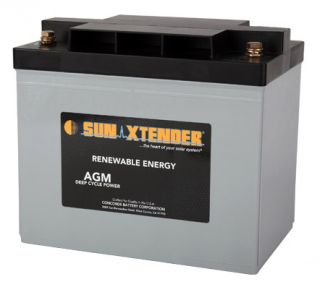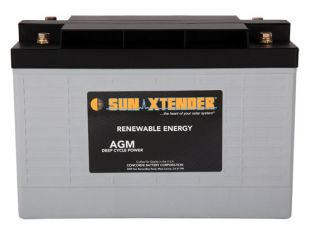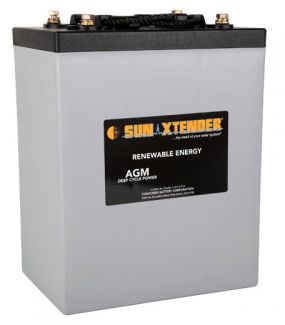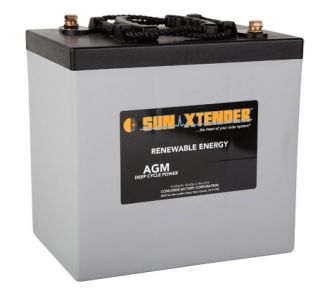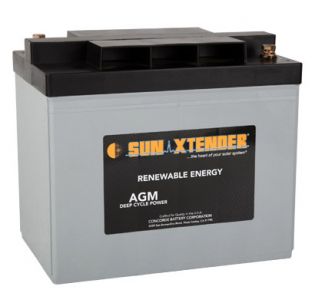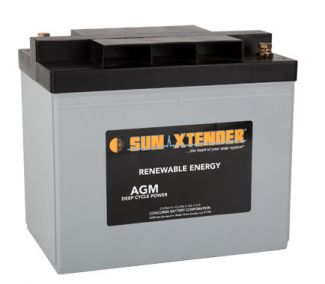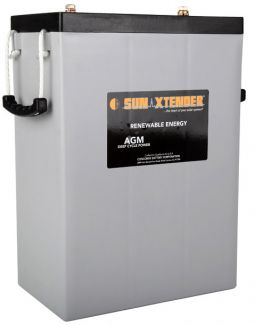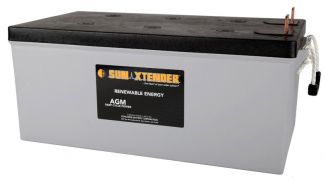Solar Batteries 101

Do I need solar batteries for my system?
Everyday we talk to customers looking to use solar energy to power all kinds of different things. For instance, if they want to simply reduce their electric bill from the local utility, then we're clearly looking at a "grid-tied" solar system. But often people want to power some type of device directly from a solar panel. Or they need mobile power, or power for something remote and away from electric utility lines, or back-up power. More often than not, this means batteries! And not just any batteries, but solar batteries (batteries suitable for solar systems).
Can't I just plug it directly into a solar panel?
Usually no. Most devices that need electricity require steady, reliable current (amps) and voltage to operate as designed. The voltage produced by a solar panel when it captures the sun's light varies constantly. Clouds, weather, and the changing position of the sun throughout the day are to blame. Also, solar panels only produce DC (direct current) electricity, which means it must be inverted to AC electricity by way of an "inverter". But an inverter requires steady, consistent energy as well. However, there are a few types of "loads" that can be powered directly from a solar panel. Certain types of attic fans or water pumps can operate effectively with the varying voltage throughout the day. But for most other loads, the DC energy from the solar panel must be first inverted to the proper form or stored in a solar battery system.
What what is a battery, really?
Putting solar aside, for a moment, we are all familiar with batteries. We use all kinds to power all kinds of devices. But at the end of the day, a battery is simply a device to store energy produced somewhere else at some other time. Like a water storage tank filled by a pump, a battery holds or stores a certain amount of energy.
How much depends on the battery's size, construction, type, chemistry, environment, etc. Unlike the throw-away AAAs in your TV remote, batteries used for solar energy systems big and small are rechargeable. A rechargeable battery can be discharged and recharged over and over again (one discharge and recharge is called a "cycle"). The battery's chemistry and type determine how deeply the battery can be discharged and the number of cycles it can perform during Its lifetime.
Batteries for Solar?
There are a number of factors to consider when buying solar batteries. Because the battery bank is one of the most expensive components of such a system, it is important to carefully design the battery bank so that it performs as expected for as many years as possible. When designing a battery bank we first analyze how the batteries will be used. How much energy must the battery bank supply to the “loads” each day? A load is any device that uses energy. People are often surprised when we ask them to list all of the loads they will use each day, the watts of each load and how many hours a day they expect to use them. But
that detailed info is needed to determine the daily watt-hours of storage which determines the battery bank size. From there we consider other factors to recommend the best battery bank for the specific situation.
Other factors
Because we're trying to keep this overview fairly basic, we will discuss factors like battery chemistry, sizes, capacity, and more in later blog posts. But we want to comment on just a couple more important points to keep in mind as you look for solar batteries.
Brands
There are quality long-lasting batteries and there are cheap short-lived batteries. We stick with quality brands. You can find cheap batteries all over the place. But if you want your batteries to last and give your solar system the most bang for the buck, it's usually worth it to get quality. We often supply quality brands that are not even on our site today, so please ask!
Deep Cycle
For solar systems, you want to stick to deep cycle batteries only. You don't want car or “starting” batteries for a solar system. If the battery doesn't list Amp Hours and instead only lists CCR (Cold Cranking Amps) then avoid it, even if the battery is labeled Deep Cycle. Deep cycle batteries are meant to slowly discharge down to a certain point and then recharge fully. And repeat that cycle over and over for many years. Car batteries are designed to a very different thing--quickly start a car engine in a short burst of current. Just remember deep cycle.
Capacity
Because solar battery systems store energy for gradual discharge (usually throughout the night), a good deep cycle battery will list its storage capacity in Amp Hours as measured over a 20 hour discharge rate (designated as "C/20"). Sometimes batteries will show different discharge rates (C/100, etc). Just make sure to use the C/20 rate to compare capacities among batteries. The more amp hours the better. Deep cycle batteries generally should not be discharged beyond 50% of its rated capacity. If they go beyond that level, the battery can be damaged and its ability to fully recharge will be reduced. For that reason, it's really important to size the battery bank correctly or else your battery life will be cut way short.
Voltage
If you are running an RV solar system, boat system, outdoor yard lights, water pump, remote instrumentation, etc., then chances are very good that you are operating equipment designed to run on 12 volts of DC electricity (sometimes designated VDC). So you will want to keep your battery bank at 12 volts. If you are powering a large off-grid home, then you'll want to be at 48 volts. Smaller cabins at 24 volts. We design battery banks to match these system voltages by using individual batteries that may be at 12 volts, 6 volts or 2 volts. Again, we'll get into the specifics in a future post, but for now that is why you'll see batteries with these different voltages listed on our site.
Chemistry
While there is a lot of hype today about lithium ion batteries, lead acid batteries still lead the way as the most economical, long-lasting battery for solar energy systems. For most people, lead acid batteries still make the most sense. But if the batteries need to be light, fully cycle daily, and at moderate temps, then lithium may be a great choice. If price isn't a big deal. But today, lithium prices are pretty high compared to lead acid.
Click here to see our lines of batteries for your application. Questions, just ask!
- Tags: Batteries Solar Basics
- Thomas Lindberg

